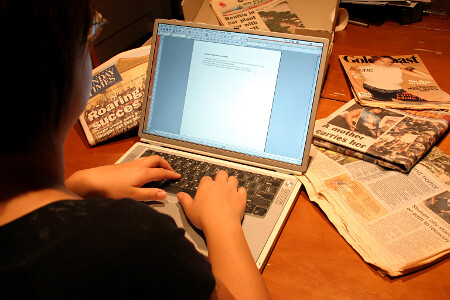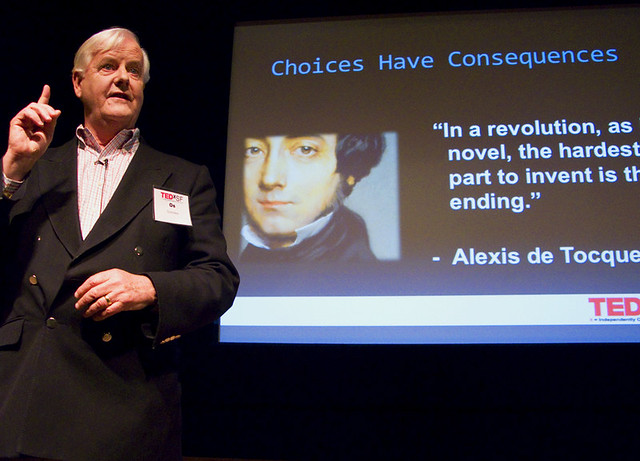Journalism
(Note: not about travel this week! I've mostly just been in Zurich...)
In the news a while ago, a number of issues had come up which led to people blaming media coverage for inciting violence / propogating stereotypes. This led me to wonder to what extent the media actually had control over this sort of stuff, and how much as a business they just reflected the views of their news-article consumers as a whole. While I haven't made it any further on this issue (the average public opinion seems to be 'blame the media!' which isn't very helpful...), I did recently read a short piece in the TED books range** called "Media Makeover" by Alisa Miller (CEO of Public Radio International) which had a few interesting takes on things which seemed worth adding for anyone interested.
The most interesting part I found concerning my question above is quite a simple idea: How much is written about stuff that readers want to read? If the correlation was low, then that's strong evidence that the media dictate what they write, and that consumers have no choice but to read it or abandon 'the news'. The higher it is however, the more I feel it gets to the public setting the news agendas, and media outlets, as a business, being forced to write about it. [an aside: of course, they could take a 'moral highground' and only publish what they deem as high-quality newsworthy articles, but putting news corporations in charge of the public agenda seems very...undemocratic, plus bad business].
So how can we measure that? Miller's article mentions the Pew Research Center, and in particular, the News Interest Index (what we read) and the News Coverage Index (what is written). While it's not an exact science, the main issues seem to correspond quite well, so at least the media is writing what people want to read - which to me, suggests that, in a world with more media sources (traditional + blogging, social media), as this is still the case then at least a lot of what is written about is because people actually think like that. As a corollary, if you want to change what is written about, you should change public opinion; it's much harder, but shouldn't be seen as the job of the media.
Note that this is in part what is happening - people are reaching around traditional media to incite their own movements, which are later picked up by the original journalists as enough of the public gain interest.
That said, a separate issue that has come up, also mentioned in Miller's piece, is the overall quality decreases when writing demand-based articles. There's enough content there for an entirely separate blog post, but in short: 24hr news cycles (the 'hamster wheel' effect) leads to things like filter bubbles and link-baiting, which is bad for everyone [see newstrust and mediamakeover for movements against this].
This post doesn't really have a message, but I guess under the label of 'fix the public opinion, not the media', I should advocate sticking to reading well-written pieces about things you don't agree with. Don't assume that journalists who write about the causes that interest you are good journalists, and likewise don't assume that those who don't (or worse, do but disagree with your conclusion) aren't. Often for divisive topics, there doesn't have to be a correlation between well researched opinions, and the conclusions reached.
That's it from me for now, but I'm still keen to hear more opinions on this. Which sets the agenda, public opinion or media? Which should it be? How can we improve it, if anything is required?
**One footnote - you may have remembered at the start of this that I mentioned reading a TED book. Sadly, I find that entire range falling into this same trap, and I now see most of their offerings as today's form of 'self-help' books, which make you feel like you're a better person without actually achieving anything. Despite topics covering the downfalls of filter bubbles and link bait, they also release quite partisan articles with self-help-y titles like "The science of optimism" or "How did you end up here?". Not to say there's anything wrong with the research, but the presentation ironically falls into many of the traps it talks about. It's no wonder that, for the TED books app, the #1 "customers also bought" app is Al Gore's climate change app.
 |
| Sepblog, flickr |
The most interesting part I found concerning my question above is quite a simple idea: How much is written about stuff that readers want to read? If the correlation was low, then that's strong evidence that the media dictate what they write, and that consumers have no choice but to read it or abandon 'the news'. The higher it is however, the more I feel it gets to the public setting the news agendas, and media outlets, as a business, being forced to write about it. [an aside: of course, they could take a 'moral highground' and only publish what they deem as high-quality newsworthy articles, but putting news corporations in charge of the public agenda seems very...undemocratic, plus bad business].
 |
| Dianaschnuth, flickr |
Note that this is in part what is happening - people are reaching around traditional media to incite their own movements, which are later picked up by the original journalists as enough of the public gain interest.
That said, a separate issue that has come up, also mentioned in Miller's piece, is the overall quality decreases when writing demand-based articles. There's enough content there for an entirely separate blog post, but in short: 24hr news cycles (the 'hamster wheel' effect) leads to things like filter bubbles and link-baiting, which is bad for everyone [see newstrust and mediamakeover for movements against this].
This post doesn't really have a message, but I guess under the label of 'fix the public opinion, not the media', I should advocate sticking to reading well-written pieces about things you don't agree with. Don't assume that journalists who write about the causes that interest you are good journalists, and likewise don't assume that those who don't (or worse, do but disagree with your conclusion) aren't. Often for divisive topics, there doesn't have to be a correlation between well researched opinions, and the conclusions reached.
That's it from me for now, but I'm still keen to hear more opinions on this. Which sets the agenda, public opinion or media? Which should it be? How can we improve it, if anything is required?
**One footnote - you may have remembered at the start of this that I mentioned reading a TED book. Sadly, I find that entire range falling into this same trap, and I now see most of their offerings as today's form of 'self-help' books, which make you feel like you're a better person without actually achieving anything. Despite topics covering the downfalls of filter bubbles and link bait, they also release quite partisan articles with self-help-y titles like "The science of optimism" or "How did you end up here?". Not to say there's anything wrong with the research, but the presentation ironically falls into many of the traps it talks about. It's no wonder that, for the TED books app, the #1 "customers also bought" app is Al Gore's climate change app.




This comment has been removed by a blog administrator.
ReplyDelete